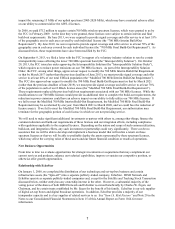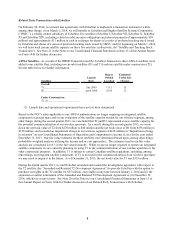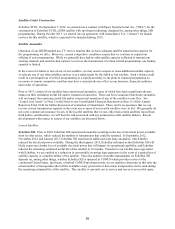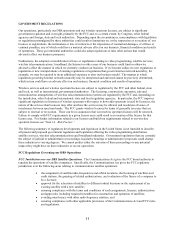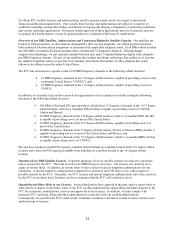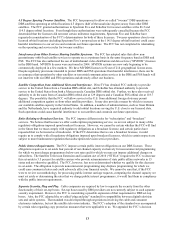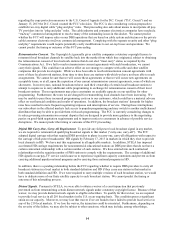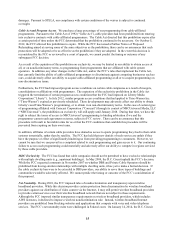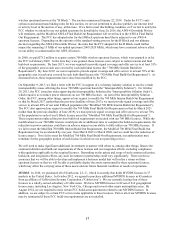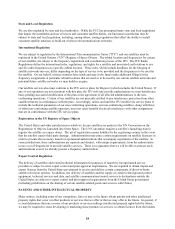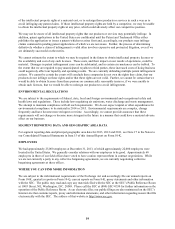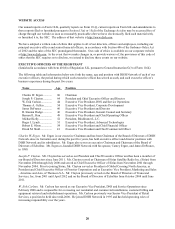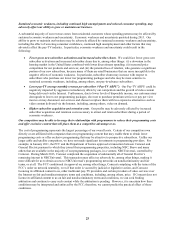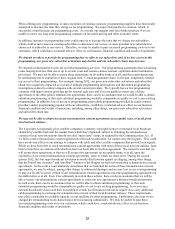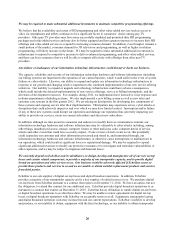Dish Network 2013 Annual Report Download - page 26
Download and view the complete annual report
Please find page 26 of the 2013 Dish Network annual report below. You can navigate through the pages in the report by either clicking on the pages listed below, or by using the keyword search tool below to find specific information within the annual report.16
16
upheld the FCC’s transparency rule, but vacated both the nondiscrimination and anti-blocking rules. It is uncertain
if the D.C. Circuit’s ruling will be challenged or if the FCC will initiate further proceedings to make rules in
accordance with the D.C. Circuit’s decision; therefore, we cannot predict the practical effect of these rules and
related proceedings on our ability to distribute our video content via the Internet.
Comcast-NBCUniversal. In January 2011, the FCC and the Department of Justice approved a transaction between
Comcast and General Electric Company (“General Electric”), pursuant to which they joined their programming
properties, including NBC, Bravo and many others, in a venture, NBCUniversal, controlled by Comcast. During
March 2013, Comcast completed the acquisition of substantially all of General Electric’s remaining interest in
NBCUniversal. The FCC conditioned its approval on, among other things, Comcast complying with the terms of
the FCC’s order on network neutrality (even if that order is vacated by judicial or legislative action) and Comcast
licensing its affiliated content to us, other traditional pay-TV providers and certain providers of video services over
the Internet on fair and nondiscriminatory terms and conditions, including, among others, price. If Comcast does not
license its affiliated content to us on fair and nondiscriminatory terms and conditions, we can seek binding
arbitration and continue to carry such content while the arbitration is pending. However, it is uncertain how these
conditions may be interpreted and enforced by the FCC; therefore, we cannot predict the practical effect of these
conditions.
FCC Regulation of our Wireless Spectrum Licenses
On March 2, 2012, the FCC approved the transfer of 40 MHz of AWS-4 wireless spectrum licenses held by DBSD
North America and TerreStar to us. On March 9, 2012, we completed the DBSD Transaction and the TerreStar
Transaction, pursuant to which we acquired, among other things, certain satellite assets and wireless spectrum
licenses held by DBSD North America and TerreStar. The total consideration to acquire the DBSD North America
and TerreStar assets was approximately $2.860 billion.
Our consolidated FCC applications for approval of the license transfers from DBSD North America and TerreStar
were accompanied by requests for waiver of the FCC’s MSS “integrated service” and spare satellite requirements
and various technical provisions. On March 21, 2012, the FCC released a Notice of Proposed Rule Making
proposing the elimination of the integrated service, spare satellite and various technical requirements associated with
the AWS-4 licenses. On December 11, 2012, the FCC approved rules that eliminated these requirements and gave
notice of its proposed modification of our AWS-4 authorizations to, among other things, allow us to offer single-
mode terrestrial terminals to customers who do not desire satellite functionality. On February 15, 2013, the FCC
issued an order, which became effective on March 7, 2013, modifying our AWS-4 licenses to expand our terrestrial
operating authority. That order imposed certain limitations on the use of a portion of this spectrum, including
interference protections for other spectrum users and power and emission limits that we presently believe could
render 5 MHz of our uplink spectrum (2000-2005 MHz) effectively unusable for terrestrial services and limit our
ability to fully utilize the remaining 15 MHz of our uplink spectrum (2005-2020 MHz) for terrestrial services.
These limitations could, among other things, impact the ongoing development of technical standards associated with
our wireless business, and may have a material adverse effect on our ability to commercialize these licenses. That
order also mandated certain interim and final build-out requirements for the licenses. By March 2017, we must
provide terrestrial signal coverage and offer terrestrial service to at least 40% of the aggregate population
represented by all of the areas covered by the licenses (the “AWS-4 Interim Build-Out Requirement”). By March
2020, we were required to provide terrestrial signal coverage and offer terrestrial service to at least 70% of the
population in each area covered by an individual license (the “AWS-4 Final Build-Out Requirement”). On
December 20, 2013, the FCC issued a further order that, among other things, extended the AWS-4 Final Build-Out
Requirement by one year to March 2021 (the “Modified AWS-4 Final Build-Out Requirement”). If we fail to meet
the AWS-4 Interim Build-Out Requirement, the Modified AWS-4 Final Build-Out Requirement may be accelerated
by one year, from March 2021 to March 2020. If we fail to meet the Modified AWS-4 Final Build-Out
Requirement, our terrestrial authorization for each license area in which we fail to meet the requirement may
terminate.
The FCC’s December 20, 2013 order also conditionally waived certain FCC rules for our AWS-4 spectrum licenses
to allow us to repurpose 20 MHz of our uplink spectrum (2000-2020 MHz) for downlink (the “AWS-4 Downlink
Waiver”). The AWS-4 Downlink Waiver and the Modified AWS-4 Final Build-Out Requirement are conditioned
upon us bidding at least a net clearing price equal to the aggregate reserve price of $1.56 billion in the auction of



